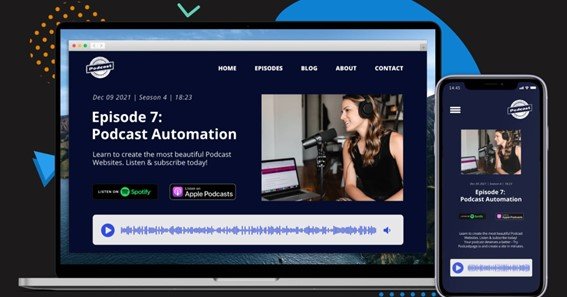If you’re running a podcast, having your own website is essential for expanding your audience and building your personal brand. A website allows you to showcase your episodes, engage with listeners, and make your podcast accessible to a wider audience. In this step-by-step guide, we will show you how to create a website for your podcast, covering everything from design tips to integrating essential features for podcast success.
Why You Need a Website for Your Podcast
Before diving into how to create a website for your podcast, let’s discuss why having a dedicated website is crucial. A website allows you to:
- Host all your podcast episodes in one place
- Improve your SEO (Search Engine Optimization) to attract more listeners
- Share additional content like blog posts, transcripts, and show notes
- Offer direct communication with your audience through email subscriptions
- Integrate social media and build a stronger community
Now, let’s explore the steps to build a podcast website.
Steps to Build a Podcast Website
1. Choose a Domain Name and Hosting
The first step in creating a podcast website from scratch is choosing a domain name that matches your podcast’s brand. Ensure the name is easy to remember, relevant to your podcast, and preferably includes the name of your show.
Next, select a web hosting provider. Platforms like Bluehost, SiteGround, or WordPress are popular choices for podcast hosting and website integration. They provide fast, reliable hosting services and offer seamless integration with your podcast RSS feed.
2. Pick the Best Platform for Your Podcast Website
When you build a podcast website, the platform you choose will play a major role in how your site looks and functions. WordPress is one of the best platforms for podcast websites due to its flexibility and range of podcast plugins. Other website builders like Wix or Squarespace are also user-friendly and offer templates specifically designed for podcasts.
3. Designing Your Podcast Website
Podcast website design tips focus on making your site user-friendly, clean, and visually appealing. Choose a template that highlights your podcast episodes and includes essential pages such as:
- Home page: Showcase the latest episodes, brief descriptions, and links to listen.
- About page: Introduce yourself, your podcast’s mission, and its topics.
- Episodes page: List all episodes, organized by category or topic.
- Contact page: Provide a way for listeners to reach you directly.
Additionally, make sure your design is responsive, meaning it works well on both desktop and mobile devices.
4. Add Essential Podcast Website Features
To create a successful podcast site, you need to incorporate key podcast website features. Here’s what you should include:
- Episode player: A built-in player to let visitors stream your podcast directly on the site.
- Subscription buttons: Links to platforms like Apple Podcasts, Spotify, and Google Podcasts.
- Show notes and transcripts: Providing additional written content can boost SEO and make your podcast more accessible.
- Email signup form: Build an email list to notify subscribers about new episodes and news.
- Blog section: Write blogs or add show notes that go along with each episode for further engagement.
5. Integrate Podcast Hosting
One of the most important steps in developing a website for a podcast is ensuring your episodes are hosted and accessible. Use podcast hosting services like Buzzsprout, Libsyn, or Anchor, and integrate your RSS feed with your website. This allows your listeners to access your latest episodes directly from your site.
6. SEO and Marketing Integration
Setting up a podcast website with SEO is vital for attracting organic traffic. Use relevant keywords in your episode titles, descriptions, and blog posts to rank higher in search engine results. Optimizing your website for search engines will help more people discover your podcast. Additionally, include social media sharing buttons to boost visibility across platforms.
FAQ
- Why is it important to create a website for your podcast?
A website offers a centralized platform for hosting your episodes, improving SEO, and engaging with your audience beyond the typical podcast apps. - What are the essential features of a podcast website?
Essential podcast website features include an episode player, subscription buttons, show notes, an email signup form, and a blog section for additional content. - How do you integrate podcast hosting with your website?
You can integrate podcast hosting by using platforms like Buzzsprout or Libsyn, which generate an RSS feed that can be connected directly to your website. - What is the best platform for building a podcast website?
WordPress is widely regarded as one of the best platforms for podcast websites due to its flexibility and the wide range of podcast plugins available. Other user-friendly options include Wix and Squarespace. - How do you set up SEO for a podcast website?
Focus on using relevant keywords in your episode titles, show notes, and blog posts. Use meta tags, optimize images, and include social sharing features to improve SEO.
By following this step-by-step guide, you can easily create a professional website that enhances your podcast’s visibility and engages your audience. With the right design, hosting, and features, your podcast website will serve as a powerful tool to grow your listener base and build a loyal community.










